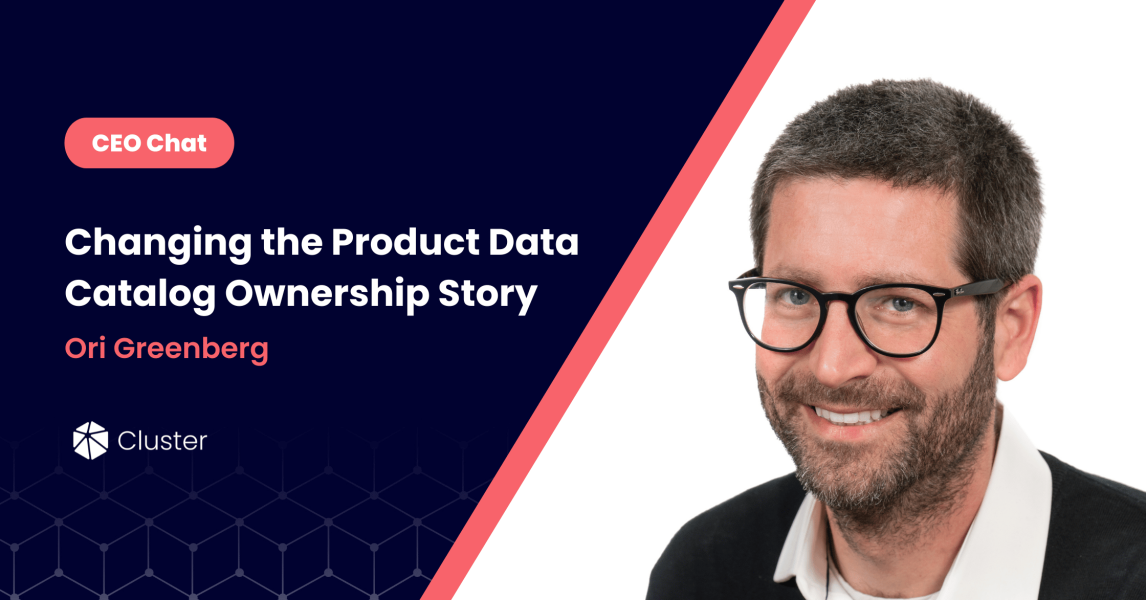For eCommerce marketplaces, it’s always the same story: they rely on sellers to provide complete and accurate product data, but what if changing ownership were a possibility? What if marketplaces actually owned their own product catalog data and took the reliance off of seller inputs, while still being able to provide accurate product information for consumers?
There are many roadblocks typically that prevent marketplace enterprises from achieving this outcome, but it is not an impossible feat. That’s why we caught up with Cluster CEO Ori Greenberg, in an interview to talk about the challenges, opportunities, and best practices for driving this industry to change. By transferring ownership of product catalog data from sellers onto marketplaces – success becomes possible for all parties involved, and below we dive into how and why.
Q: Who owns the product data catalog today in the eCommerce market and why? Is this the standard for most marketplaces?
GREENBERG: In the eCommerce marketplace landscape it always tends to be the same story. A marketplace starts by relying on sellers or merchants to provide product data, but quickly realizes it is a mess:
- The data is insufficient, and not normalized
- The marketplace catalog experience is bad for consumers.
- The marketplace catalog is underperforming in SEO and marketing in general.
- It is actually hard for sellers to list items and causes friction, sending 50% of them to abandon the onboarding process.
However, owning the product data catalog makes so much sense. The sellers can help, but the marketplace must own the process, the guidelines and the standards – to help your sellers comply with those standards.
And if you’re thinking this is not possible, this has been done successfully by enterprises like Amazon’s marketplace, and Google Shopping – and in looking at those examples, the results are clear. That being said, no one has the breadth that Amazon and Google have by themselves – and that’s why Cluster was created.
Q: What does the ideal marketplace product data catalog look like?
GREENBERG: The ideal marketplace product data catalog should be:
- Rich with structured product data.
- Detailed in taxonomy.
- Inviting, filterable and pleasant in every way.
Q: What is the best practice when it comes to ownership of the product catalog data?
GREENBERG: As mentioned earlier, marketplaces should own the catalog onboarding process, guidelines, and standards – and marketplaces need to help their sellers and merchants comply with those guidelines.
Q: Why is it so essential to follow these best practices?
GREENBERG: Loosening the rules on product data catalog ownership can cause a mess that spills into other business aspects across the board, and result in poor customer experience, bad seller experience, and poor performance overall.
Q: What are the roadblocks that keep marketplaces from gaining ownership of their product catalog data?
GREENBERG: Gaining ownership of your product catalog data is hard to set up, and taking the first steps can be difficult. You’ll ask yourself why would the sellers go through all the trouble to onboard their product information, and how do I even decide what to ask from them?
The reality is that it is a lot easier just to tell people, “Here you go – a platform – now just list your products! We’ll use Machine Learning and AI in the future to make sense of what you write!” And then you find out you can’t accomplish this, and the technology just isn’t there – but it’s too late. And, changing your practice becomes even more difficult.
Q: How can marketplaces work with sellers to create a mutually beneficial catalog onboarding process?
GREENBERG: First, marketplaces need to realize what data they need in order to provide a good customer experience and a frictionless seller experience. Next, help the existing sellers by adjusting their current catalog data. Provide clear guidelines on what is needed moving forward, and proactively help them provide the required catalog data. Examples of how to do this include:
- Pre-build a product data catalog. Start with top-of-mind categories,
- Match existing items with the ones in the pre-defined catalog.
- Provide matching tools for new products added to the catalog.
- Enhance items that are not in that pre-defined catalog on the fly using advanced tools and third-party data providers like Cluster.
Q: How does Cluster help?
GREENBERG: Cluster is an eCommerce data provider that solves for creating a superior online shopping experience through quality catalog and product data for marketplaces and online enterprises (including adjacent markets like eRetail, brands, and financial institutions).
When marketplaces do not have a complete understanding of their product variants, they can oftentimes end up with duplicate listings, which confuses shoppers and in turn, sends them to competitor sites. Building a quality product data catalog is a challenge, but Cluster can identify, validate and enhance product data by matching duplicate products, so inaccurate information doesn’t find its way in front of your shoppers.
Q: What does the future of eCommerce marketplace data look like?
GREENBERG: No new marketplace can provide an Amazon-like experience, which consumers are now expecting, from the get-go without requiring any help. From the product data catalog to the fulfillment of orders, marketplaces will need to partner with industry-leading vendors to get ahead of the game.
Mutual Marketplace and Merchant Benefits
Changing the script of a story (especially in the middle) is not an easy task, but the results can make for a much happier ending. In this case, restarting can seem daunting but the mutually beneficial results for merchants, marketplaces, and ultimately consumers, can make a major impact on success. Talk with a Cluster expert today and see how our game-changing insights can work for you.
FUN FACTS
Little-Known Fact:
When time allows, I love to geek out with customers’ data. Even if the customer didn’t ask for anything, I love finding trends, data gaps, assortment gaps, and insights in general that are intriguing. Usually, I keep it to myself, but sometimes I can’t help but share it with the customer/account owner.
Quotes to Live By:
Be kind.
Favorite Marketplace:
For basic purchases, Amazon and Walmart. For fun, spontaneous or emotional purchases: Facebook Marketplace. I love the sustainability aspect, plus the fact I can ‘Uber’ a product my way in 20 minutes!
Favorite Snack:
Coffee.
Describe Cluster in 5 Words:
- Comprehensive
- Granular
- Accurate
- Unique
- Insightful




